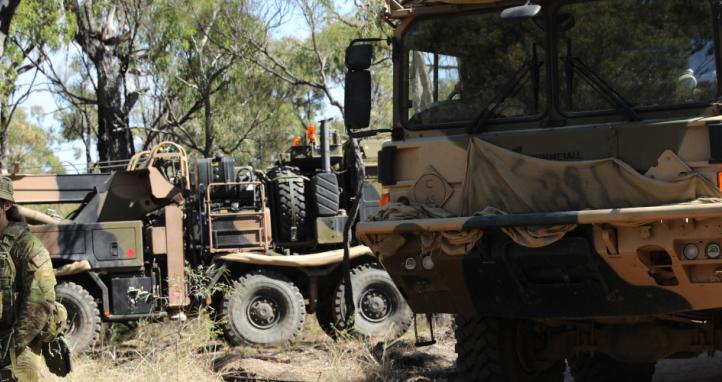Slow: Live Life Simply is the third book review in an accidental trinity. The accident is that I did not plan to connect three leaders in our community through their writing and books. These three leaders, Dr Jo Lukins @Dr_Jo_Lukins, Dr Rebecca Jackson @bec_TJC, and Ms Avril Henry @avrilhenry, are all authors and are all influencers in the Australian Defence Force (ADF). While their presence enabling the ADF originates separately, in Townsville (Dr Lukins), Canberra (Dr Jackson) and Sydney (Ms Henry), their unifying influence on ADF cultural leadership, resilience and ethics spreads throughout Australia and internationally.
The accidental trinity is Slow by Brooke McAlary, recommended by Avril Henry, joining Dr Lukins’, The Elite: Think like an athlete succeed like a champion – 10 things the elite do differently, and Dr Jackson’s, The Journey of You – be the hero of your own adventure. I commend these three books as a valuable contemporary resource for leaders seeking professional military education that challenges thinking, while enabling their people and teams to assess and evaluate their personal, professional and cultural potential.
The Avril Henry connection to Slow by Brooke McAlary requires additional clarification. Avril is an accomplished author and her works include Leadership Revelations in how we achieve the gender tipping point, Leadership Revelations II: how Australians lead in crises, and Leadership Revelations – an Australian perspective. This book, Slow was recommended by Avril for me to read. Written inside the book’s cover is Avril’s advice:
Go slower, to go faster!
Through Avril’s act of advice and kindness the accidental trinity was born. Importantly, in addition to this accidental trinity, I am indebted to Jo Lukins, Rebecca Jackson and Avril Henry for their leadership, influence and guidance to me and thousands of ADF members during this last half-decade.
Slow: Live Life Simply
Brooke McAlary speaks directly to personalities who join the ADF: ‘doing less is for underachievers, slowing down is for weak, boring, mediocre, average and ordinary people’.[i] Brooke McAlary felt she was trapped by ideas and expectations of relentless requirements for action: ‘stuff, status, activity, likes, followers, friends and money’.[ii]
To break the cycle of exhausting herself, and her family, through continuous competition, Brooke McAlary selected a change to benefit her ‘health, happiness, work, home, parenting, relationships, finances and self-esteem’.[iii] This change was a life of: ‘less stuff, less stress, fewer obligations and fewer pressures [enabling] a life of more – more time, more energy, more freedom, more joy, more presence, more connection, more creativity and more health’.[iv]
Over twelve months, Brooke and her husband ‘let go of 20,000 items from their home’, regained their weekends by ‘learning to say no, do less and embrace the lost art of downtime’, reined in ‘mindless spending by questioning wants and needs’, re-evaluated their measures of success and their long-term employment goals.[v] Brooke McAlary concedes that this process of Slow is ‘imperfect and still evolving’, but as a family they have ‘never been more at peace’.[vi]
Slow provides ideas on how we can all choose to:
- Slow down
- Cease the ever-revolving carousel of want-buy-want-buy-upgrade
- Opt out of comparison games
- Stop cramming our weekends with activities
- Refuse to live our lives according to trends
- Tread lighter on the earth
- Create a home and a life that is simpler, slower and, most importantly, works for you[vii]
Slow is a balance of:
- Being prepared and being prepared to let go
- Being present and walking away
- Doing the important things and forgetting those that are not
- Being organised and flexible[viii]
- Cultivating self-awareness and spending time noticing[ix]
Some techniques for Slow
Brooke McAlary recommends we define ourselves as we begin to Slow.
Self-definition includes:
- Write your eulogy in three sentences: ‘what kind of life would I need to live in order for people to say the things I wanted them to say about me?’ [x]
- Pay attention by defining:
Our next step is to de-clutter:
- Australians spend $1.1 billion per year on self-storage. [xiii]
- In de-cluttering, limit time allocated, start small and employ tiny actions. For example, clean out your handbag or wallet, then one drawer, one shelf, one car seat, one room, etc., in an ever expanding effort to progressively de-clutter with the least personal burden.[xiv]
- Thoughtfully dispose, donate or creatively re-use your excess possessions.[xv]
- Collect ‘memories, kindness and friendships.’[xvi]
We can then de-own:
- We need: shelter, food, water and access to medical care.[xvii]
- De-owning is to ‘tap resources that already exist’ meaning:[xviii]
Embrace mindfulness:
- We all need: a margin, a buffer, room for change or flux, spare capacity, space to personally expand.[xxi]
- Mindfulness, like any habit, needs practice requiring us to notice and pay attention.[xxii]
- Choosing to notice is mindfulness, and includes:[xxiii]
- Paying attention to the people closest to you
- Creativity
- Getting outside
- Gardening
- Disconnecting from your phone
- Yoga
- Meditation
- Exercise
- Deep breathing
- Taking stock of your senses
- Laughing
- Spreading kindness
- Smiling[xxiv]
Disconnect to reconnect:
In 2018, Kashmir Hill decided to disconnect from ‘Amazon, Facebook, Google, Microsoft and Apple — each for a week, and then all at once’. Her conclusion ‘I got out of some bad tech habits… and I'm just kind of looking at screens less. So, if nothing else, I'm glad I did this experiment in terms of becoming a healthier tech user.’[xxv]
- Technology provides:
- Community connections
- Communication
- Education
- Self-improvements
- Awareness
- Opportunity
- Understanding[xxvi]
- Technology consumes:
- Time
- Empathy
- Diversity of ideas
- Action
- Meaning
- Discernment
- Downtime, including sleep
- Confidence, through endless comparisons
- Focus[xxvii]
- Disconnect to reconnect:
- No screens at the table, in the bedroom, in the morning.
- Limited screens Monday – Friday
- Remove apps and notifications
- Only check social-media on one device
- Only check emails when you have time to answer them
- Set device time limits
- Take a digital sabbatical[xxviii]
Some actions to construct a life of intention, mindfulness & kindness:
- Sleep
- Self-talk… tell yourself that you are loved and valued
- Gratitude… not ‘I will be happy when…’
- Don’t think of contentment as the ‘underachieving cousin of happiness’[xxix]
- Read
- Eat well
- Exercise
- Travel (difficult during COVID-19)[xxx]
Stop seeking perfection… achieve a Wobbly Balance:
- Isn’t slowing down just another item on my to-do list? [xxxi]
- Does our ‘balance’ look like perfection? With:
- Everything in its place
- Evenly weighted
- Everyone happy
- Everything correct
- All upright and steady[xxxii]
- In contrast, a Wobbly Balance means:
- Engaging our core:
- What do you want at the centre of your life?
- What makes you strong?
- What makes your relaxed?
- Our priorities are not equal. Not everything in our lives deserves the same weight. Aim instead for the correct weight.
- Due to our ‘seasons in life’ weight shifts, according to priorities, between family, work, downtime, health.[xxxiii]
- Balance isn’t a daily act. Not everything will get our attention every day.
- Balance is fluid and flexible.
- Balance is intention.
- We ‘tilt’ away from one priority to deeply focus on another.[xxxiv]
- Paying attention to our custodianship and expenditure of time. [xxxv]
- Overcome procrastination by commencing the ‘tiniest first step possible on a given task’. [xxxvi]
- Follow the Gretchen Rubin ‘One-Minute Rule’:
- I must do any task that can be finished in one minute. Hang up my coat, read a letter and toss it, fill in a form, answer an email, note down a citation, pick up my phone messages, file a paper, put a dish in the dishwasher, replenish the diaper supply by the changing table, put the magazines away… and so on.[xxxvii]
- Engaging our core:
- In other words: when something happens outside our control, we have complete freedom in how we respond to it.
Conclusion
Knowing that perfect does not exist, we all can reflect upon our own: mindfulness, exercise (physical and mental), diet and sleep.[xxxviii] We can also work to:
- Define ourselves.
- De-clutter
- De-own
- Embrace mindfulness
- Disconnect to reconnect
- Construct a life of intention, mindfulness & kindness
- Stop seeking perfection… achieve a Wobbly Balance
Finally, Brooke McAlary summaries her approach to Slow as:
…tiny pockets of mindfulness, regular meditation, a consistent yoga practice, single-tasking, quality time with loved ones and gratitude… which [provide Brooke] energy, margin and buffer to go fast when necessary.[xxxix]









